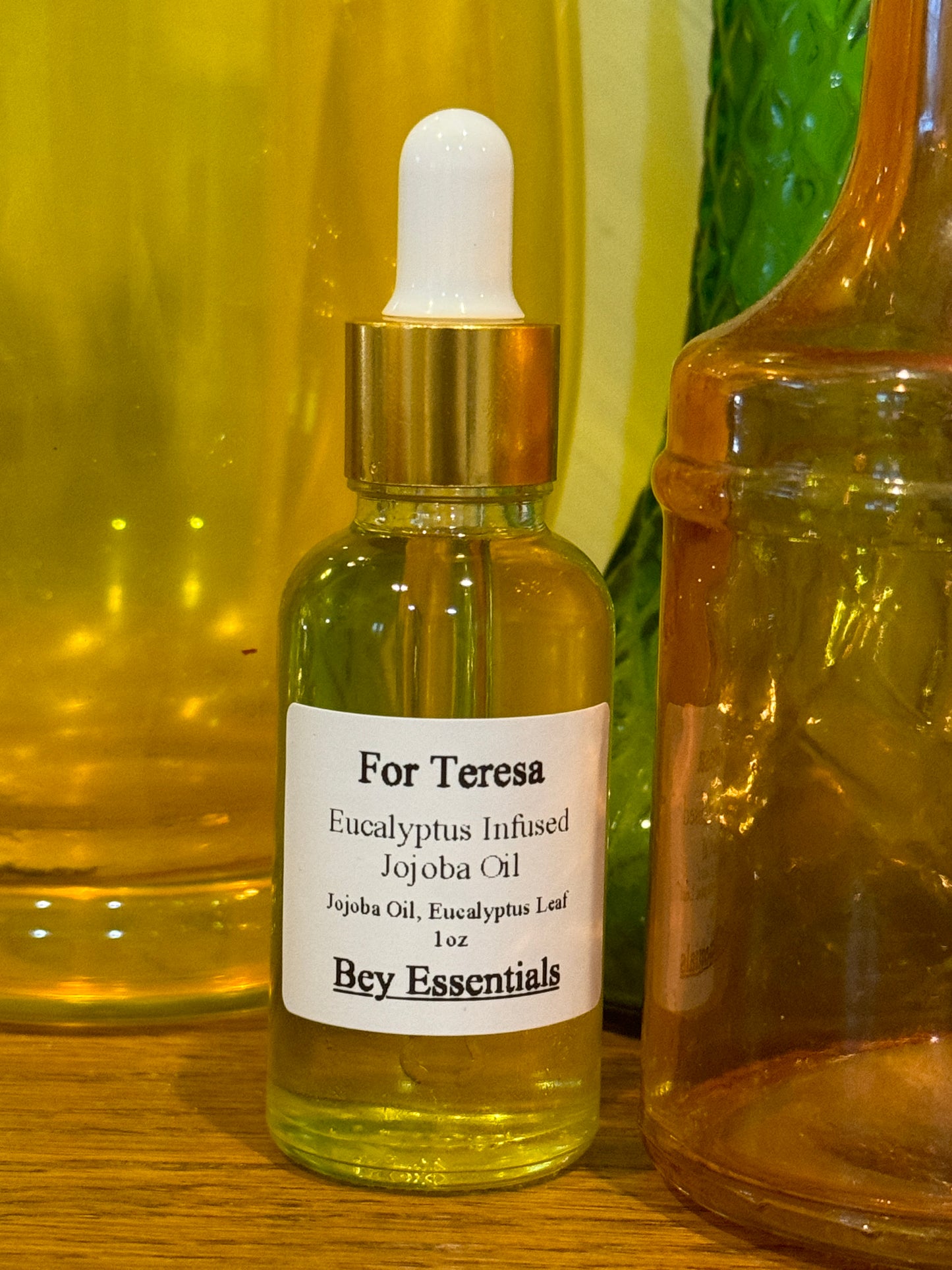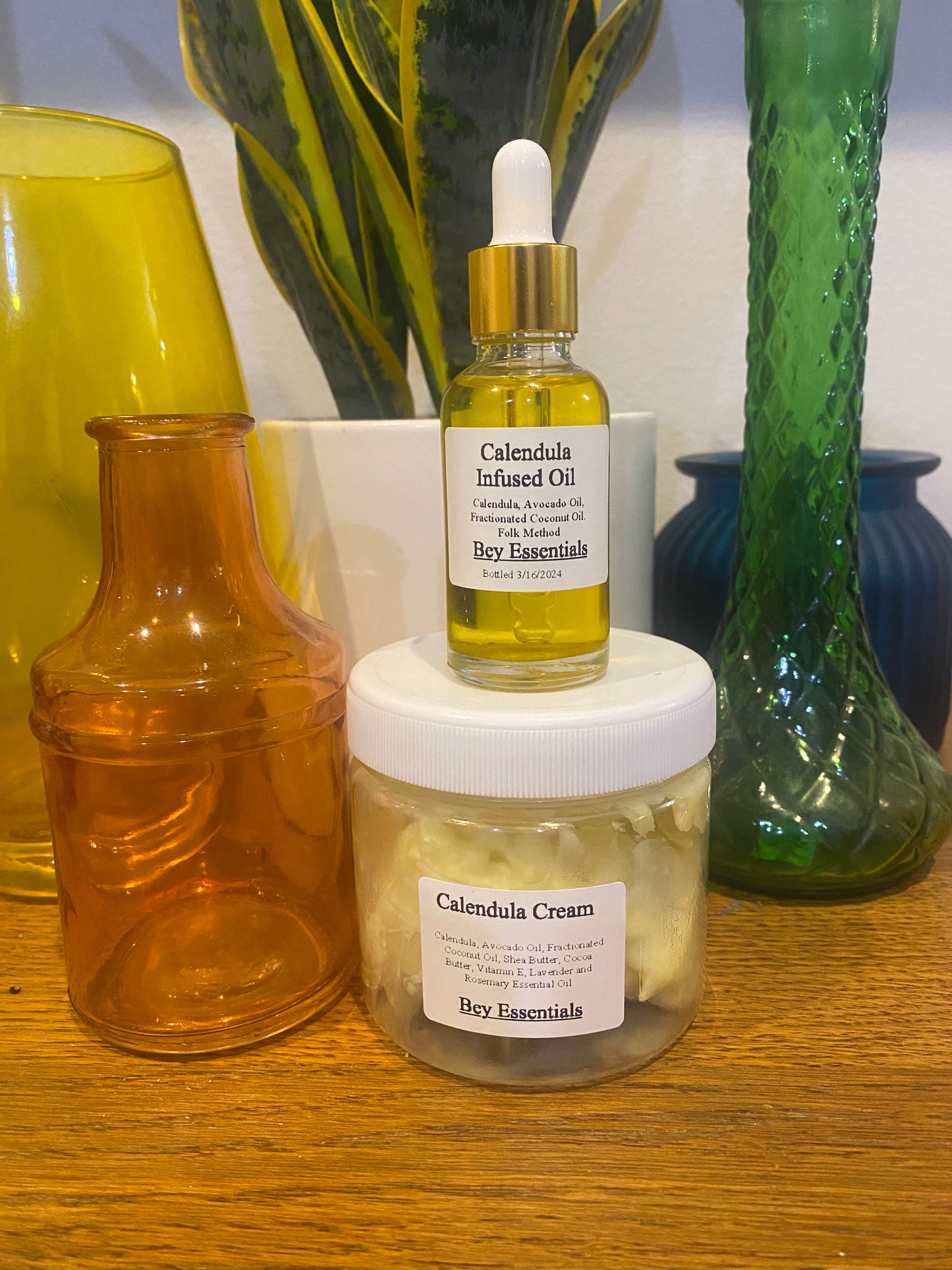Bey Essentials
Custom Infused Oil
Custom Infused Oil
Order a 1 oz bottle of infused oil. Select your oil and your herb. Infusion take up to two weeks to infuse. Traditional uses of herbs and oils below.
Couldn't load pickup availability
Share
Getting to know oils
Jojoba Oil has been used traditionally for:
1. Moisturizing: Its molecular structure closely resembles that of the skin's natural sebum, making it an excellent moisturizer for both skin and hair.
2. Scalp treatment: Known for its soothing properties, jojoba oil is used to alleviate dry scalp, dandruff, and itching.
3. Hair conditioning: It can be applied to hair to add shine, reduce frizz, and nourish dry or damaged strands.
4. Makeup removal: Its gentle yet effective cleansing properties make it suitable for removing makeup and impurities without stripping the skin's natural oils.
Coconut Oil has been used traditionally for:
1. Hair conditioning: Renowned for its deep conditioning properties, coconut oil is applied to hair to moisturize, soften, and strengthen strands.
2. Skin moisturizing: It is often used as a natural moisturizer for dry skin, helping to hydrate and smooth rough patches.
3. Makeup removal: Its emollient nature makes it effective in breaking down makeup and lifting away impurities from the skin.
4. Sunburn relief: Coconut oil's soothing properties can provide relief from sunburned skin, helping to alleviate redness and inflammation.
Grapeseed Oil has been used traditionally for:
1. Antioxidant protection: Rich in antioxidants, grapeseed oil is applied to the skin to protect against free radical damage and premature aging.
2. Lightweight moisturizing: Its light texture makes it an ideal moisturizer for oily or acne-prone skin, providing hydration without clogging pores.
3. Hair conditioning: Grapeseed oil can be used to moisturize and condition hair, leaving it soft, smooth, and manageable.
4. Massage oil: Its silky texture and mild aroma make it a popular choice for massage, helping to relax muscles and nourish the skin.
Avocado Oil has been used traditionally for:
1. Deep hydration: Avocado oil is highly moisturizing and is often used to hydrate and nourish dry, flaky skin.
2. Skin repair: Its rich content of vitamins A, D, and E, along with omega-3 fatty acids, promotes skin regeneration and repair, making it beneficial for damaged or mature skin.
3. Scalp treatment: Avocado oil can help soothe and moisturize the scalp, relieving dryness, itching, and dandruff.
4. Cuticle care: It can be applied to the nails and cuticles to soften and moisturize, promoting healthy nail growth and preventing hangnails.
Getting to know herbs
Calendula has been used traditionally for:
1. Skin healing: Calendula's anti-inflammatory and antiseptic properties make it effective in soothing and healing minor cuts, wounds, and skin irritations.
2. Eczema and dermatitis: It is often used topically to relieve symptoms of eczema, dermatitis, and other inflammatory skin conditions.
3. Sunburn relief: Calendula's soothing properties help to calm sunburned skin, reducing redness and discomfort.
4. Diaper rash treatment: Its gentle nature makes it suitable for soothing and healing diaper rash in infants and sensitive skin areas.
Lavender has been used traditionally for:
1. Relaxation and stress relief: Lavender oil is renowned for its calming aroma, which helps to promote relaxation and reduce stress and anxiety.
2. Skin care: It is used to soothe and heal minor burns, insect bites, and skin irritations due to its antiseptic and anti-inflammatory properties.
3. Hair care: Lavender oil is often added to hair care products for its soothing effects on the scalp and its ability to promote hair growth and reduce dandruff.
4. Sleep aid: Its aromatic properties make it a popular choice for promoting restful sleep when used in aromatherapy or as a pillow spray.
Plantain has been used traditionally for:
1. Skin healing: Plantain leaves are often used topically to soothe and heal minor cuts, wounds, insect bites, and stings.
2. Anti-inflammatory: Its anti-inflammatory properties help to reduce swelling and inflammation associated with skin irritations and minor injuries.
3. Poison ivy relief: Plantain is commonly used to alleviate itching and irritation caused by poison ivy, oak, or sumac.
4. Drawing properties: Poultices made from plantain leaves are used to draw out toxins, splinters, and foreign objects from the skin.
Peppermint has been used traditionally for:
1. Digestive health: Peppermint oil is known for its ability to relieve symptoms of indigestion, bloating, and gas when ingested or applied topically to the abdomen.
2. Headache relief: Its cooling and analgesic properties make it effective in alleviating tension headaches and migraines when applied topically or inhaled as aromatherapy.
3. Skin cooling: Peppermint oil can provide a cooling sensation when applied to the skin, making it useful for soothing sunburns, itching, and irritation.
4. Respiratory support: Inhaled peppermint oil can help to clear nasal congestion and relieve symptoms of colds, coughs, and sinus infections.
Chamomile has been used traditionally for:
1. Relaxation and sleep aid: Chamomile tea is widely consumed for its calming effects, promoting relaxation and improving sleep quality.
2. Skin care: Chamomile's anti-inflammatory and antiseptic properties make it beneficial for soothing and healing minor skin irritations, rashes, and sunburns.
3. Eye health: Chamomile tea bags are used as a compress to soothe tired or irritated eyes and reduce puffiness and dark circles.
4. Digestive health: Chamomile tea is often consumed to relieve symptoms of indigestion, bloating, and stomach cramps, as it helps to relax the digestive system and reduce inflammation.





